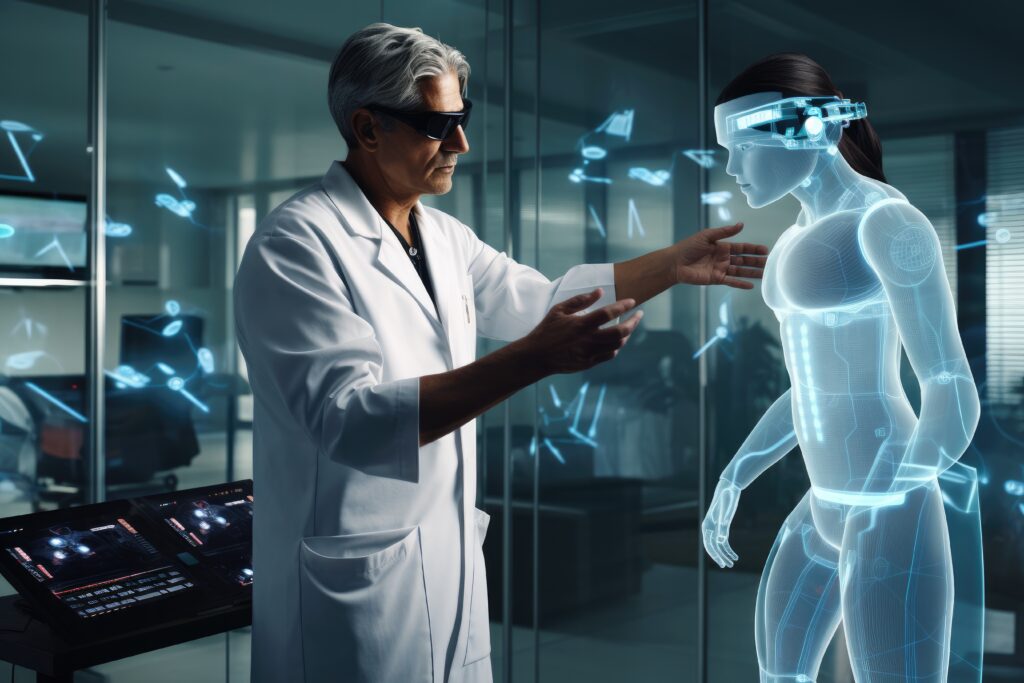How medical professionals identify, treat, and oversee patient care is being rapidly reshaped by AI in the healthcare sector. AI and healthcare are now closely related, from sophisticated AI diagnostic tools that identify illnesses early to generative AI models that support individualized treatment regimens.
AI-powered solutions are being used by medical facilities to streamline processes, lower error rates, and increase diagnostic precision.
It is anticipated that the application of artificial intelligence in healthcare will develop further in the future, whether it be to assist doctors in deciphering complex medical images or to use predictive algorithms developed by innovative companies. This article looks at the primary applications of AI in medicine, along with its benefits and possible future advancements.
What Does AI Mean in the Field of Healthcare?
AI in healthcare refers to the use of advanced technologies—like machine learning, deep learning, and natural language processing—to improve medical care for both patients and professionals. To put it simply, it involves teaching computers to examine enormous volumes of health data, identify trends, and support decision-making that was previously done exclusively by humans. This translates into better treatment plans, quicker and more accurate diagnoses, and more individualized patient care. Beyond its clinical applications, artificial intelligence in healthcare also simplifies administrative duties like scheduling and medical record management. AI is radically altering the way healthcare is provided, from algorithms that assist in predicting patient risks to AI tools that scan imaging for early indications of disease. AI systems help physicians, nurses, and hospital employees provide safer, more effective, and more economical care by learning and adapting.

AI Apps Examples in Healthcare
AI in healthcare is no longer theoretical—it’s actively transforming how medical professionals diagnose, treat, and support patients. Here are key examples of how artificial intelligence is improving medicine and healthcare.
Medical Diagnosis
AI is excellent at finding patterns in patient data and medical images, which helps with earlier and more precise disease diagnosis. Algorithms can predict the risk of heart disease long before symptoms show up or identify subtle indications of cancer on radiology scans. Even in patients who don’t exhibit any symptoms, AI models at the Mayo Clinic have identified left ventricular dysfunction, a form of heart weakness.
Drug Discovery
Conventional drug development is costly and time-consuming. AI speeds this up by predicting side effects, identifying promising trial candidates, and modeling the potential actions of novel compounds. This reduces time and expenses, which is important because it frequently costs more than $1 billion to bring a single drug to market.
Patient Experience
AI is used by chatbots and virtual assistants to remind users, respond to medical inquiries, and help patients with treatments. These tools customize interactions and cut down on wait times. In some online health forums, patients even give AI chatbot responses higher ratings than human responses, according to some studies.
Healthcare Data and Tasks Management
Hospitals generate massive amounts of data. AI connects scattered records, finds important insights, and automates administrative work like billing or clinical documentation. This frees up staff to focus more on patient care and less on paperwork.
Robotic Surgery
AI powers robots that assist surgeons with delicate operations. Machines provide a magnified, 3D view of surgical sites and precisely follow a surgeon’s movements, leading to fewer complications and faster recovery times. Procedures once requiring long hospital stays can now be performed with minimal incisions.
Complex Measurements and Imaging
AI can analyze dozens of medical images in seconds. At Mayo Clinic’s PKD Center, AI automatically measures total kidney volume—a key predictor in polycystic kidney disease—cutting analysis time from 45 minutes to just seconds.
Information Promotion & Public Health
AI developers keep an eye on internet data to forecast disease outbreaks and direct public health communications. Algorithms connected search patterns with real-world case spikes during the initial waves of COVID-19, demonstrating how AI can influence how people react to medical emergencies.
Chronic Illness Management
AI tools help patients manage diabetes, hypertension, and asthma by sending medication reminders, monitoring wearable data, and suggesting lifestyle adjustments. This proactive support reduces complications and hospital visits.
Clinical Trial Optimization
Finding the right participants for trials is challenging. AI sorts through health records to match eligible patients faster, which improves study timelines and helps bring treatments to market sooner.
Mental Health Support
AI-driven apps offer round-the-clock mental health services, such as chatbots for cognitive behavioral therapy and emotional state monitoring. The effectiveness of psychotherapy professionals is increased by these solutions’ prompt assistance and early risk assessment.
These illustrations highlight the deep integration of AI throughout the healthcare ecosystem, which is transforming medicine’s future while improving diagnosis, speeding up research, and improving patient experiences.

Advantages of AI in Healthcare
Improved Diagnostic Accuracy
Improving diagnostic accuracy is one of AI’s greatest benefits for the medical field. Thousands of lab reports, genetic profiles, and medical photos can be processed by machine learning algorithms to identify patterns that human eyes might overlook. This implies that illnesses like cancer, heart disease, or neurological disorders can be detected earlier and more accurately. Better long-term results and more effective treatments are frequently the results of early detection.
Personalized Care
AI plays a key role in advancing personalized medicine. By analyzing individual health records, genetics, lifestyle habits, and even social factors, AI can recommend treatment plans that are specifically tailored to each patient. This reduces the risk of adverse reactions and increases the effectiveness of therapies, moving away from the traditional one-size-fits-all approach.
Predictive Analytics
Artificial intelligence systems are demonstrating high performance in predictive analytics. Using large data sets, they can forecast potential health risks, including the likelihood of developing diabetes or cardiovascular disease. These predictions allow medical professionals to proactively monitor patients’ conditions and take timely preventative measures, preventing serious complications.
Proactive Care
The advantage of proactive care is closely related to predictive analytics. Clinicians can take early action by ordering tests or modifying medication before issues become serious thanks to AI tools that monitor patient data in real time. This promotes improved chronic disease management and lowers hospital admissions.
Optimized Resource Allocation
AI helps hospitals and clinics use their resources more efficiently. Artificial intelligence helps economic reforms manage businesses. Predictive models can forecast patient flow and determine staffing and equipment needs. This approach enables smarter planning, inventory optimization, reduced wait times, and the availability of critical resources when needed.
Reduced Unnecessary Tests
Based on the analysis of patient histories and biological defense systems, AI can identify redundant or unnecessary evidence and procedures. This reduces healthcare costs, reduces patient burden, eliminates unnecessary diagnostics, and minimizes associated risks and stress.
Enhanced Safety
AI improves patient safety by acting as an additional layer of oversight. It can double-check medication doses, identify potential drug interactions, and validate surgical plans. By catching possible errors before they reach the patient, AI significantly lowers the chances of harm.
Disadvantages of Using Artificial Intelligence in Healthcare
Discrimination
AI systems learn from existing data. If that data is biased—favoring certain demographics or patient groups—the AI can reinforce inequalities, leading to unfair or inappropriate care recommendations for underrepresented populations.
Mistakes and Misinterpretations
Even the most advanced artificial intelligence models are susceptible to error. Incorrect interpretation of patient data or the use of an incorrect algorithmic template can lead to an inaccurate diagnosis or the selection of an ineffective treatment method, potentially threatening patient safety.
Privacy Risks
Artificial intelligence systems in healthcare process vast amounts of personal medical information. Without reliable protection, the risk of leaks, unauthorized access, and misuse of confidential patient data increases.
Regulatory Challenges
Healthcare is highly regulated, but many existing regulations did not initially take into account the use of AI systems. This leaves hospitals and developers facing significant challenges in complying with requirements related to patient safety, data use, and medical liability.
Ethical Concerns and Trust
Patients and providers need to understand how AI systems arrive at decisions. Without transparency, it’s hard to build trust in recommendations or verify that they align with accepted medical evidence. Ethical concerns also include ensuring AI doesn’t override human judgment or erode the patient–physician relationship.

Categories of AI in Healthcare
Machine Learning (ML)
Machine learning is one of the most widely used AI technologies in healthcare. By training algorithms on vast datasets—such as medical images, lab results, and patient histories—ML can detect complex patterns, predict disease progression, and recommend personalized treatments. Deep learning, a subset of ML, is especially powerful in analyzing radiology scans or genomic data to support precise diagnoses.
Natural Language Processing (NLP)
NLP enables computers to interpret and process human language. In healthcare, it’s used to extract valuable insights from unstructured clinical notes, streamline documentation through speech-to-text tools, and even identify trends in published medical research. NLP also powers chatbots that answer patient questions and guide them through care processes.
Clinical Rule-Based Systems (CRM)
Many healthcare organizations still rely on rule-based systems that use “if-then” logic to support clinical decisions, flag potential drug interactions, or enforce compliance protocols. Though simpler than modern machine learning, CRM tools help standardize care and assist with routine diagnostics.
APIs and System Integrations
Application programming interfaces (APIs) are essential for integrating AI tools with existing electronic health record (EHR) systems. APIs enable seamless data sharing, so AI applications can pull real-time patient information and deliver insights without disrupting workflows.
Cloud Data and Analytics Platforms
Significant changes in the healthcare economy have been made possible by AI-powered cloud solutions that securely store and process large volumes of data. By supporting predictive modeling, and advanced analytics, these platforms drive innovation and advance precision medicine.
Together, these AI categories are revolutionizing the healthcare industry by accelerating, improving, and personalizing administrative, diagnostic, and treatment procedures.
AI and the Health Insurance Portability and Accountability Act (HIPAA)
As AI becomes more prevalent in healthcare, it is critical to ensure that its use complies with HIPAA regulations. AI systems require vast amounts of protected health information (PHI) in order to identify patterns, predict outcomes, and personalize care. HIPAA mandates that healthcare providers and their partners enforce strict privacy and security rules to safeguard this data.
However, AI introduces new challenges. Machine learning models often require large, complex datasets, increasing the risk of breaches or unauthorized access. De-identification—commonly used to protect patient identities—isn’t foolproof, as advanced analytics can sometimes re-identify individuals. This raises serious privacy concerns under HIPAA rules.
There are also questions around accountability. If an AI tool uses PHI to make a recommendation that leads to harm, it’s unclear whether liability falls on the provider, the software developer, or both. As a result, regulatory updates may be needed to define how HIPAA governs AI-driven care.
Healthcare companies are strengthening access controls, improving encryption, and educating employees about the privacy risks associated with AI in order to allay these worries. HIPAA will probably need to be further modified as AI develops in order to maintain patient data’s security, morality, and compliance with federal regulations.

The Future of Artificial Intelligence in Healthcare
Artificial intelligence will fundamentally alter methods for patient care, diagnosis, and treatment. Ten years ago, it would have seemed impossible to turn genetic and clinical data into individualized treatment plans, but with the development of machine learning and advanced analytics, artificial intelligence (AI) will make it possible for more precise disease predictions and truly personalized medicine.
AI-powered tools are also expected to improve the quality of surgical care through real-time decision support and remote collaboration capabilities, allowing specialists to perform complex procedures anywhere in the world. At the same time, intelligent monitoring systems will reduce patient fatigue by filtering out non-critical alarms and helping medical teams focus on the most urgent tasks.
Wearable technology and AI-powered remote monitoring systems will continue to track chronic illnesses outside of hospitals, notifying physicians of even the smallest changes in health before they become more serious. As a result, proactive prevention will become the primary focus of healthcare instead of reactive treatment.
AI is already speeding up the creation of novel medications and making it easier to find biomarkers in scientific research, which is leading to the development of ground-breaking treatments. By examining sizable data sets to find trends that support clinical judgments, it is also filling in knowledge gaps in the field of medicine.
With the development of the technology, it’s imperative to make sure AI is integrated responsibly. Building trust, being transparent, getting rid of bias, and integrating AI systems with actual clinical procedures are all essential for future success. Artificial intelligence has the potential to be a game-changing collaborator in providing safer, more efficient, and more equitable healthcare if it is handled properly.
Conclusion
Artificial intelligence is rapidly becoming an integral part of modern healthcare, offering powerful tools for improving diagnostic accuracy, personalizing treatment, and streamlining clinical processes. From machine learning models that predict disease risk to AI platforms that accelerate administrative tasks, these technologies are changing the way healthcare is delivered and perceived.
Healthcare executives need to address privacy, bias, and ethical integration concerns if they want to fully utilize AI. The healthcare industry will be able to provide safer, more efficient, and more equitable care by fostering trust, safeguarding patient data, and making sure AI enhances professional expertise rather than replaces it. As developments progress, AI will greatly enhance treatment results and the standard of patient care in addition to assisting physicians and nurses in their work.s and nurses but also profoundly enhance patient outcomes and experiences.




